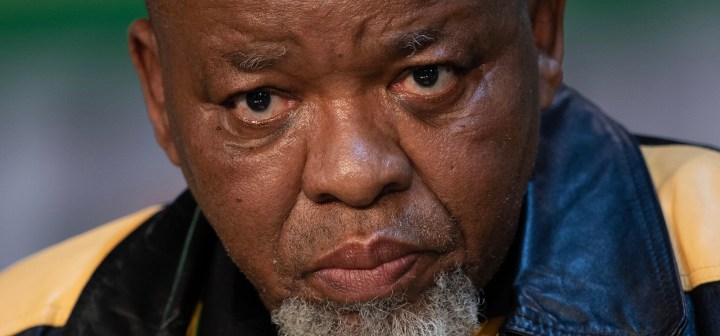MINISTERIAL DEFLECTION OP-ED
Are environmental NGOs anti-development, as Gwede Mantashe claims? Wessa responds

The notion put forward by Gwede Mantashe of environmental NGOs being ‘foreign-funded’ by groups that are ‘anti-development’ is insulting to the work that many NGOs tirelessly carry out to protect our environment. These claims are not on record as ever having been made in court.
An article in TimesLive on 16 May 2023 quotes Minister of Minerals and Energy Gwede Mantashe, in his department’s budget vote in Parliament, as saying that environmental NGOs block development in South Africa.
He speaks of “lobby groups, mostly foreign-funded, that pit the development needs of poor communities against their own self-serving, self-proclaimed protection of the environment” who have “veto power” over development.
This is obviously a tactic of attempting to distract the public from the core issues the minister wishes to avoid, and the Wildlife and Environment Society of South Africa (Wessa) considers it useful to respond to these risible claims, and in so doing must be understood as reflecting only our position.
This response is a product of the collective input from Wessa’s Environmental Governance Committee, an unpaid volunteer-supported committee.
The Constitution
Key to our approach is section 24 of the Constitution of the Republic of South Africa. Section 24, which clearly applies in relation to any development activity in the country, whether aimed at exploiting fossil fuel reserves or otherwise, provides that everyone has the right to an environment that is not harmful to health or wellbeing.
It goes on to provide that everyone has the right to have the environment protected for the benefit of present and future generations through reasonable legislative and other measures that, among other things, secure ecologically sustainable development and use of natural resources while promoting justifiable economic and social development (emphasis added).
Wesssa understands section 24 as follows: First, it is an integrated right, the two clauses of which are not to be regarded separately. Second, the “development needs of poor communities” (and, for that matter, all South Africans) must be evaluated through the prism of section 24.
In the leading South African case dealing with the interpretation of section 24, the 2007 Fuel Retailers judgment of the Constitutional Court, Chief Justice Sandile Ngcobo observed that:
“Development cannot subsist upon a deteriorating environmental base. Unlimited development is detrimental to the environment and the destruction of the environment is detrimental to development. Promotion of development requires the protection of the environment. Yet the environment cannot be protected if development does not pay attention to the costs of environmental destruction. The environment and development are thus inexorably linked.”
It is clear, therefore, that South Africa’s development needs must be evaluated in this light. Unfortunately, in most cases, this often seems to be inconsistent with what Minister Mantashe and those who follow his line of thinking regard as development.
As Tracy-Lynn Humby, one of South Africa’s leading environmental lawyers, suggested in her 2016 article, “The right to development-in-environment and ecological and developmental thresholds”, justification of development (purportedly consistent with section 24, one presumes) is “dominated” by environmental impact assessment reports compiled for purposes of environmental authorisations.
Generally, these reports do not adequately interrogate the claims of the developers in relation to the quality of the development, including contribution to employment.
Assumed benefits
In the 2022 Sustaining the Wild Coast case, the Full Bench of the Eastern Cape High Court highlighted that the environmental management programme (submitted in support of the development that was the subject of that litigation) stated that “the seismic survey would create jobs and increase government revenues, etc,” but there was “no detail to substantiate these claims… no explanation as to how the jobs will be created, and how the economy will be stimulated, or how the seismic survey will improve the socio-economic circumstances in which most South Africans live”.
We urge all South Africans not to be swept up by the rhetoric of a declining industry and vested interests, but rather to ask how we remain part of nature and sustain the benefits with which we are blessed.
This is a typical example of how the economic and social benefits of development are simply assumed.
Section 24 demands more. Not only must development be “ecologically sustainable” but it must also not be harmful to South Africans’ health or wellbeing.
To ensure this, it is necessary that consideration of development requires “a much greater focus on the quality of development undertaken and its relation to meeting basic needs.
“Justifying a development on the basis of how much it will contribute to the gross domestic product, or how many jobs it will create, should not be enough”, according to Humby.
We agree with this, as well as her observation that “arguing that an ecologically destructive development should proceed because it creates jobs would be wrong-headed because, what should matter, is the quality and longevity of such jobs, the manner in which the development takes away existing livelihoods and jobs that are dependent upon the natural resource base – now and in the future – the impact of the development on food security, access to water, health, education, and so on.”
The fact that Wessa subscribes to the views outlined above does not mean that Wessa is “anti-development”. On the contrary, Wessa is cognisant of the fact that South Africa requires significant development in order not only to address the pervasive crises of poverty, unemployment and inequality, but also to improve unacceptable impacts on our environment.
We argue that an African model of sustainability sees humans as part of nature, not separate from it, and that development must sustain our natural resources in order to sustain ourselves.
Increasing heavy levels of air pollution from the burning of fossil fuels and pollution of our rivers from a variety of sources is incongruent with that approach.
To argue we “need development” and not provide clear proof of a carefully-weighed assessment of its contribution to social, economic and environmental objectives – and without considering whether it unacceptably undermines or degrades our natural capital – is, in our view, a failing of the constitutional mandate.
Wessa has been in opposition to several developments precisely because they do not do this – not because we are in opposition to development per se.
‘Foreign-funded NGOs’
The idea of environmental NGOs being “foreign-funded” by groups that are “anti-development” also demands a response.
The picture painted of environmental NGOs dancing to the tune of their foreign puppet masters is not true in the majority of cases. It is also insulting to the work that many NGOs and their volunteers tirelessly carry out in seeking to protect our environment.
It is interesting that these claims are not on record as ever having been made in court. Environmental NGOs, who have to resort to litigation in order to vindicate the environmental rights of everyone, rely for their legal standing on acting in the public interest or the interest of the environment.
The courts have well-established principles and considerations that they bring into play in order to assess whether litigants are hiding behind public interest – for example, to further the agendas of sinister foreigners who do not want development in South Africa – and there are no examples of this ever having been argued in court, let alone found by courts to be the case. This is particularly telling, in our view.
Further, the idea that environmental NGOs have a “veto power” could not be further from the truth. While NGOs have the power to participate in decisions affecting the environment, thus providing input into the processes as mandated by the relevant legislation and the constitutional precepts of transparency, accountability and fairness, the decisions are made by the relevant government departments (including the Department of Minerals and Energy).
These include both initial decisions and appeals. If taken on review, the decisions are made by the courts. If NGOs did have veto power, many development decisions that have been approved would not have been.
When talking about amending legislation, presumably to lessen the influence of NGOs in these processes, is it possible that Mantashe could be ignoring the Constitution?
Why the deflection?
Finally, the question to ask of the minister is – why the deflection? Why argue what is good for the West is good for Africa; that we must follow them, not lead? Why is exploiting new oil and gas reserves contrary to what the IPCC and International Energy Agency show is necessary to stay within the 1.5°C warming threshold and achieve carbon net-zero by 2050, the only route to development?
We are blessed with an abundance of sun and wind resources. Why then hand our future to foreign corporates such as Shell and Total, who will act in their shareholder interests and not in the interest of South Africans?
Colonialism and apartheid set South Africa up as a place of exploitation for the benefit of foreign interests, and in response, section 24 is a key defence against further exploitation.
We urge all South Africans not to be swept up by the rhetoric of a declining industry and vested interests, but rather to ask how we remain part of nature and sustain the benefits with which we are blessed.
We do not believe that blame should be laid at the NGO doorstep, and encourage the minister not to vilify important role-players in the socioeconomic and conservation sectors in South Africa, who often work together with government in pursuit of common environmental, social and economic objectives. DM
Michael Kidd is Professor of Law at the University of KwaZulu-Natal in Pietermaritzburg and a member of the Wildlife and Environment Society of SA (Wessa) Environmental Governance Committee, on whose behalf he writes here. He specialises in environmental law, administrative law and water law, and has been working in these fields for more than 30 years.




















It doesn’t matter who funds the NGO. What matters is that they are on the right side of the law. In any case if ANC is concerned about environmental challenges why don’t they change the law with their majority in parliament instead of blaming NGO for enforcing the law.
Exactly you have described Mantashe through the lens of the constitution … that in fact he is the one wishing to oppress the poor through unscrupulous development and not the other way round as he claims.
Destroying livelihoods in the Karoo for gas and the area in the Eastern Cape over the Kei river for titanium displayes his rentier self serving agenda at the very cost to our people who farm and live on that land. Thank the good lord for NGOs like Wessa and dedicated individuals who uphold our laws as they were intended.
This is a very good response by WESSA. Some people think we are a species separate from Nature – No! Our very survival on the planet depends on what we do or don’t do in the next few years.
A coherent, logical and factual response to Greedy’s Spin. How much longer can this man remain as the de facto Prime Minister. Our children’s future simply cannot afford this dinsosaur
If the anc ruling elite funded environmental institutions or looked after environmental interest better, there would be no need for ‘the west’ to fund NGOs. If gm and his troops (the anc) did not steal from the taxpayers the country would be at the forefront of development and environmental well being in Africa.
The several degrading and uninformed comments made by Mantasha begs the question “where was he in 1995?” August of 1995 all interested in environmental protection attended an environmental conference President Mandela was keynote speaker. It was resolved that a participatory process will be initiated to gain input from communities regarding environmental matters. The zeitgeist was that government will not follow Apartheid and decide for the people. The Consulting National Environmental Policy, CONNEP, was launched. When implemented it was called CONNEPP, Consultative National Environmental Policy Process, funded by government. The Green Paper for Environmental Management was developed from widespread public input. Further consultation established the White Paper. Based on this the National Environmental Management Act, NEMA, was formulated. The people of South Africa therefore developed the environmental Act. Section 24 of the Interim Constitution was interrogated at a workshop in Pietermaritzburg. It resulted in the wording of Section 24 as in the Bill of Rights today. All funded by government. Mantasha insults South Africans and his government with his ignorant utterances. His arguments for abuse of the environment are those of developers. We know their tricks. Creation of jobs is a popular argument along with manipulating the public consultation process. Corruption also slants EIA’s. Public vigilance is imperative. In South Africa it should not be frowned on Mr Mantasha